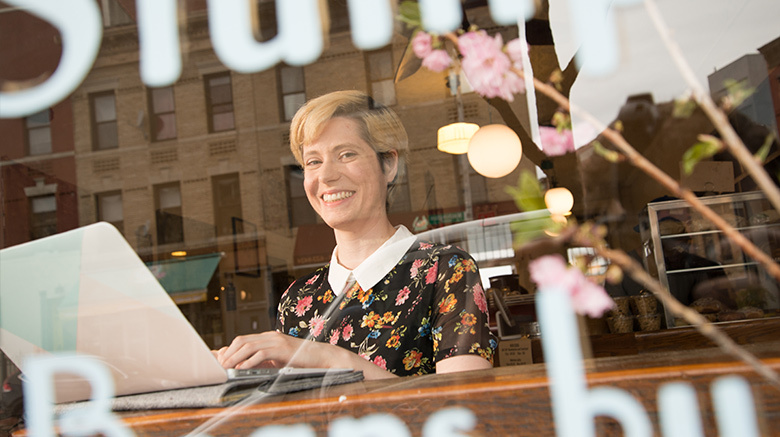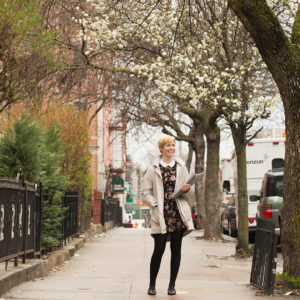Thanks to social media, anyone with a cellphone and WiFi connection is now considered a journalist. An influencer. And all too often, a credible source.
It’s increasingly rare for an intriguing post to originate from a bona fide journalist. Contemporary culture has emphasized the importance of timely tweets, listicles and clickbait. So, what about the importance of proper grammar, the inverted pyramid and nut graph? Not so much.
Before Twitter, before Facebook and before #PressOn was a trending hashtag, Shannon Carlin was working toward her future career as a journalist at St. Joseph’s College — one story at a time.
A 2008 SJC Long Island graduate, Carlin went on to earn her master’s degree from the CUNY Graduate School of Journalism in 2011. Now, she’s living a life many English grads would envy, that of a full-time writer in Brooklyn. Carlin spends her days as the entertainment features writer for Bustle, a popular women’s website, and boasts an expanding résumé that includes writing credits for NPR, Spin, The New York Times and Bust Magazine.
For Carlin, who had dreamed of becoming a journalist since she was a child — self-publishing Mary-Kate and Ashley Olsen fanzines on her Gateway computer — an awareness of her ambitions meshed perfectly with the academic experience of St. Joseph’s.
“At St. Joe’s, I was allowed to branch out and put my personality into my writing,” she said. “Because the classes were so intimate, you got a chance to get one-on-one feedback. It prepared me for the editing process as a journalist. It was great to have professors who really wanted you to find your voice and think outside the box.”
At St. Joe’s, I was allowed to branch out and put my personality into my writing.”
Entering the field of writing as a full-time career can be daunting. Especially in the contemporary world. With quick-hits essential for a writer to make ends meet, Carlin’s days are spent generating a high volume of viral articles covering a variety of topics. The reality of the market can seem demanding for some writers, but Carlin finds hope and promise in the grind.
“I think the media landscape is challenging for writers right now, and it can be a little discouraging,” she said.
“It’s a lot of aggregation, and it feels like it’s hard to make money off of longform reported pieces. But I’d love to continue writing thoughtful stories about people who deserve to have their stories told. I’m hopeful there will always be a market for that.”
It’s those longform pieces, such as her profile of Iranian- American comedian Negin Farsad, published in 2016 by Refinery29.com, that make Carlin proud to be a journalist.
“It was really interesting to talk to (Farsad) about the reaction she was getting from people around the country while she was touring,” she said. “There were people who would ask her how she felt about 9/11, but Farsad — a comedian with master’s degrees in African-American studies and public policy — really just wanted to use her comedy to show people that being Muslim didn’t make her any different from them.”
In the ever-changing worlds of publishing and journalism, Carlin is thankful for the sturdy foundation she received from her Department of English professors at St. Joseph’s.
“I’ve always preferred to listen, rather than speak. And I ask a lot of questions,” she said. “But I’m also really opinionated – quietly and probably surprisingly so, for those who don’t really know me. Journalism always felt like the perfect way to combine these sides of myself.
“At St. Joe’s, it really was nice to take classes where your professors knew your name and, when you would see them years later, would still remember it.”


